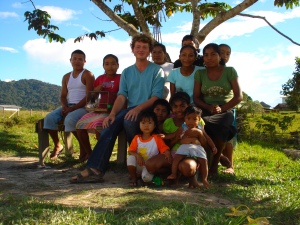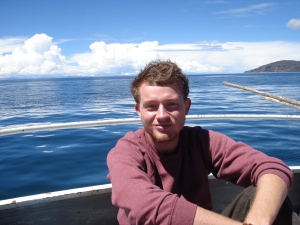“Life has seemed so much richer since I returned from Guyana”

Thomas Younger (Guyana, 08/09) writes about the many different ways his Project Trust year at Paramakatoi in Guyana has influcened his life years after – from teaching to trekking to thinking.
When asked to reflect on how my year away through Project Trust impacted upon me, I initially found it quite difficult to pin-point any single change that had taken place in myself during the course of that year spent working in Paramakatoi Secondary School, in the verdant North Pakaraimas of Guyana (2008/ 2009). I now realise that that is because of just how drastically the year reshaped my life, as I know it does for many.
It’s instructive for me to think back on how my parents almost had to push me on to the train to Glasgow for my selection course, even after my initial decision to give Project Trust a shot. In comparison with my younger brothers, who have always been outgoing, and, as twins, spirit one another on with an exuberance that has occasionally resulted in misjudged risks and even broken bones, I had always been more timid, with a tendency to err very much on the side of caution. This was compounded considerably by an incident in my early teens, when I was hit by a car as I was walking to school. The physical fallout from the accident quickly faded, but I carried the psychological scars a lot longer; I would still experience anxiety when crossing congested roads even as I prepared to leave for South America. In that regard, it surprises me that I ever committed myself to a move so radical as the one offered by PT in the first place.
During the time that I lived amongst the Patamona, one of the nine remaining tribes of indigenous people in Guyana, I was gradually infused more and more by their worldview. Whether we were sat together gaffing (chatting) drinking casiri (fermented cassava drink), making our way through the rainforest to a friend’s farm, or on a longer journey to one of the outlying villages, which could only be reached on foot in this remote region, I was learning so much more than I was even aware of at the time. Along with Sam, my partner, I covered much of the region on foot, sometimes walking for up to 9 or 10 hours through the jungle and across the savannah. Often overawed by the enormity of the forest, and frequently more than a little sweaty and foot-sore, we came to know this little-known corner of South America intimately, village by village, coming to feel a closeness with people whose lives had once seemed so far removed from our own in the UK. I was shown astonishing generosity by friends and strangers alike, who lived in ‘poverty’ yet acted with a richness of spirit rarely encountered in the wealthy West. All the while, my concept of ‘home’ underwent a subtle but lasting transformation, with the help of many indefatigable friends, as the novel grew familiar and dearer to me than I could have envisaged.
Life has seemed so much richer since I returned from Guyana. I discovered a new interest in languages; I now study Spanish alongside Philosophy at the University of Glasgow. The openness to the other that so impressed me in my Patamona friends is something I’ve endeavoured to nurture within myself in the years since my return; I recently returned from a second year abroad, this time living in the Amazonian region of Peru, as well as the country’s second largest city, Arequipa. Opting to do one of the university’s pre-arranged exchanges didn’t even occur to me; after all, it just seemed natural to go back and visit my Patamona friends before going on to live in another part of that vast forest that is the Amazon. I tried my hand at teaching once again, variously in a Catholic seminary in the rainforest-city of Iquitos and in the girls school Los Sagrados Corazones in Arequipa, a post I attained almost certainly on the strength of my past teaching experience with PT in Guyana. That early classroom experience in Paramakatoi ended up teaching me more than I was ever able to teach (though I hope my students left feeling they had learnt something as well!), particularly in terms of commitment, patience, spontaneity and the art of listening. Those days spent walking ‘the line’, which is what jungle trails are called in Patamona parlance, have exerted their own influence upon my activities during these past few years: most notably when, two summers ago, I spent close to a month following the Camino de Santiago almost 800km from France to Santiago, near the west coast of Spain, an undertaking that I was prepared for by the often arduous treks I had made along with Sam and our mates through the forests of the Pakaraimas. Being in nature teaches quiet confidence in an inimitable way.
Though I’m to turn 22 in a couple of days’ time, and so am recognizant of the fact that I am still very young and probably yet to unravel the greater part of the lessons drawn from that first year ‘away from home’ – an expression which has quite diminished meaning for me now – I still find that these words from James Hollis capture something of what I saw over the course of a year spent in Guyana and see with ever steadier clarity now:
“The world is more magical, less predictable, more autonomous, less controllable, more varied, less simple, more infinite, less knowable, more wonderfully troubling than we could have imagined being able to tolerate when we were young.”
But tolerate it we do, and isn’t the journey all the more incredible for it?
– Written by Thomas Younger

